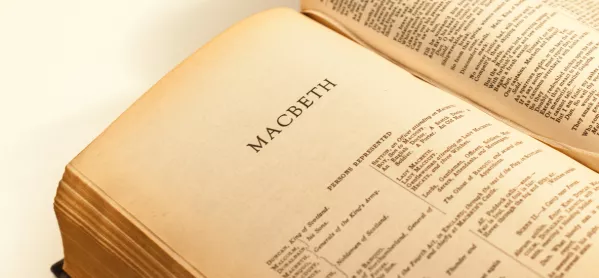- Home
- GCSEs: Toil and trouble over Macbeth exam question
GCSEs: Toil and trouble over Macbeth exam question

An extract from Macbeth in this year’s Edexcel GCSE English literature exam has provoked debate among English teachers, with some fearing the text will have been inaccessible for lower-ability pupils.
In the Edexcel paper, an extract from Act 2 Scene 3 of the Shakespeare play was included, in which a drunken porter at Macbeth’s castle pretends to be the gatekeeper of hell itself.
The scene is a comic interlude after the dramatic climax of Macbeth’s murder of King Duncan, providing rich commentary on the action of the play.
But the complexity of its language has led some English teachers to question whether it was truly accessible for students of all abilities in a non-tiered, all-ability exam.
Related: ‘To explore gender politics, point pupils to Macbeth’
Opinion: ‘GCSE English felt like ritualised humiliation’
Analysis: Are the GCSEs a reliable measure of education?
Dr Rebecca Fisher, chief executive of the English Association (EA) at the University of Leicester, said: “While an able candidate would find plenty to say about this complex extract, a less able candidate would not enjoy the same opportunity to demonstrate their skills and knowledge by responding to questions that are appropriate to their ability.
GCSE English: A comedy of errors?
“Tiering the exam - so that candidates answer questions scaled to their ability - would enable all candidates to achieve their fullest potential, and would mitigate the risk that schools will choose not to enter their less able students for this exam.
“The EA believes that the study and enjoyment of literature is an entitlement for all students, regardless of ability, and that the GCSE specifications ought to facilitate this.”
However, others have defended the extract’s use on Twitter.
Helan Victoria, an English teacher and examiner from Lancashire, said the extract was a “fundamental” scene in the play.
And Amy Forrester, an English teacher and Tes columnist, said that while she does not teach the Edexcel specification, she “can’t see any reason why it’s not accessible.”
“I love teaching that scene,” she said. “I’ve covered it with really weak groups before and they wrote really well about it - if you’ve taught it well, it’s accessible.”
“In all honesty, I think the extract exposed that some teachers aren’t teaching the whole text, which is a real concern because they should be. You can’t blame an exam board for using an extract when the guidance is teach the whole play.”
Some have pointed out that the nature of the Edexcel literature paper means students answering this question would not get any credit for referring to the rest of the play - as the question only awards marks for analysis of language and structure.
Alice Bloom, an English teacher in Oxford, said this made the question “barely accessible”.
“I was slightly concerned that some teachers don’t cover the extract at all, because in the exam any extract will be fair game,” she said.
But she added that reactions from teachers on Twitter, especially from those who do not teach Edexcel, were unhelpful.
“I know some teachers on Twitter were saying things along the lines of, ‘Well, if you teach Macbeth it’s your responsibility to make sure your students can answer the question - mine would be fine if that came up,’ but I found these comments quite unhelpful and unsupportive,” she said.
“I teach in a school where a significant number of students don’t even have English as a first language, some have come to the UK as refugees, and for them to write on Shakespeare in Year 11 is a fantastic achievement. I am a strong believer in exam boards making kids feel successful, and giving them questions they can have a go at, setting them up to feel confident and like they can access the paper,” she said.
A Pearson spokesperson said: “We are aware that some teachers and students have expressed concern over the choice of the Porter Scene (Act 2 Scene 3, lines 1 to 32) from Macbeth in our GCSE English literature paper that was sat on 15 May 2019.
“We want to reassure students that the selection of this extract and the choice of question was scrutinised by several senior examiners. The length and quantity of material in the extract offered sufficient scope for candidates of all abilities to explore Shakespeare’s language, form and structure, irrespective of whether they had studied the Porter in detail prior to the examination.
“Our priority when developing examination papers is to ensure that students across all abilities have the opportunity to demonstrate what they have learned. The performance of students on this question is as we would expect it to be.
“Our marking and awarding processes, including the setting of grade boundaries, are designed to ensure that no student is disadvantaged. All students receiving their results [this] week can be assured that they have been treated fairly and can have confidence that they will achieve a grade that reflects their ability.”
Register with Tes and you can read two free articles every month plus you'll have access to our range of award-winning newsletters.



